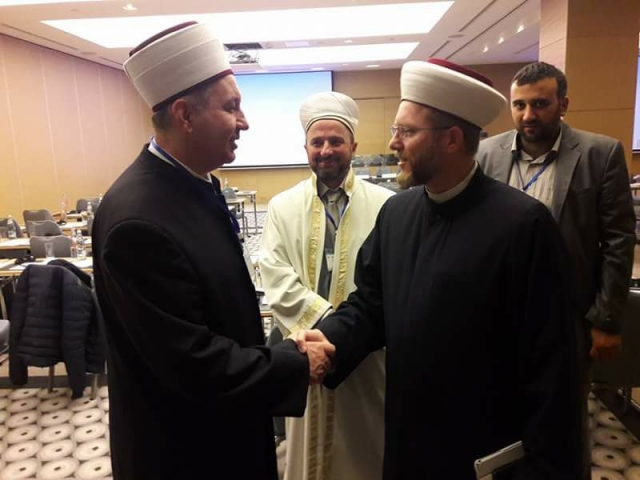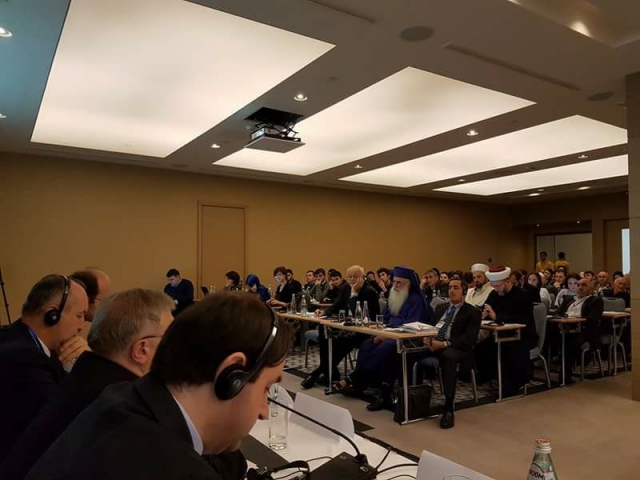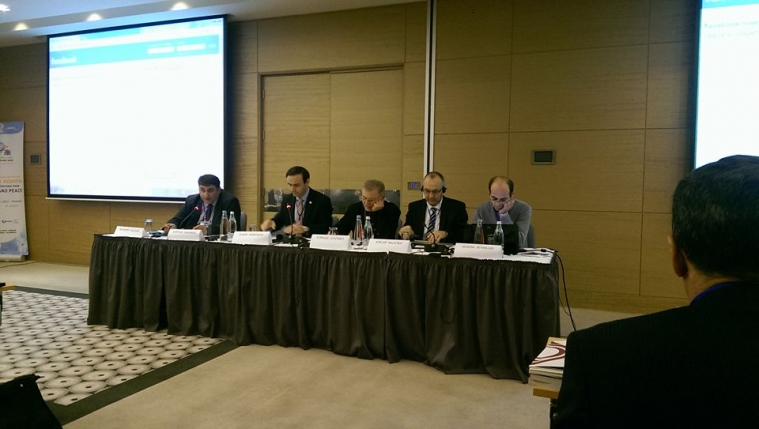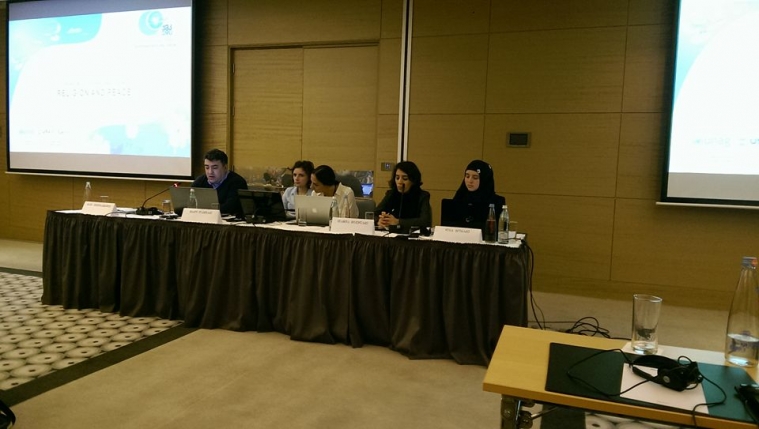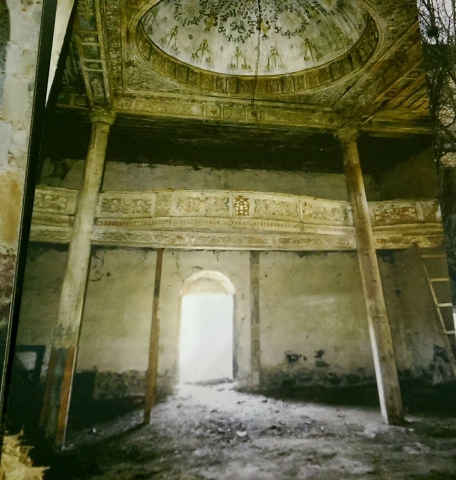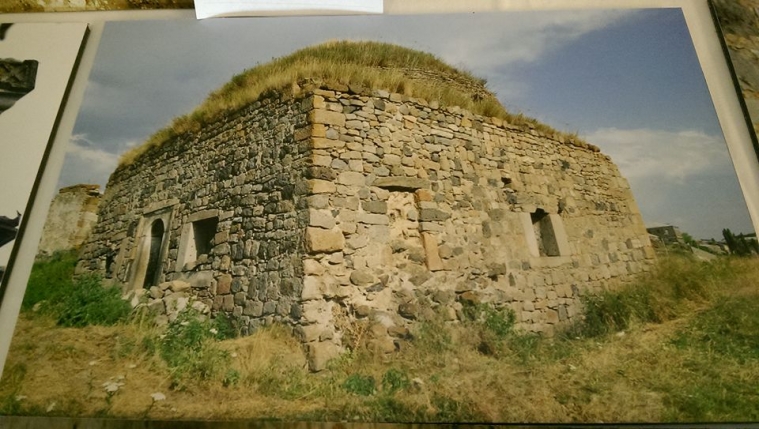The II International Forum of Religion and Peace was held in Batumi (Georgia) recently, which was attended by religious leaders and human rights activists from around the world. In addition to the representatives of the host country, the forum was attended by the delegations from Turkey, Iran, Slovenia, Qatar, Sweden, Belgium and Ukraine.
Sheikh Said Ismagilov, Mufti of Religious Administration of Muslims of Ukraine "Ummah", welcomed the participants and brought greetings from all Ukrainian ummah, noting the relevance of the event in light of the challenges that the world faces:
—The geopolitical changes are powerfully going on and Muslims are at the centre of these changes or even become one of the reasons of them — said Sheikh Said, while opening his report on "Muslims of Ukraine and the challenges of our time: war, occupation and migration crisis."
Ukrainian Mufti said that the state of religious rights and freedoms in Ukraine was among the topics of discussion. Mufti made the facts of the repression against the Crimean Tatars public, as it turned out, that the world community knows almost nothing about it.
— I paid a special attention to Muslims of the occupied Crimea (in his report. — Ed.). As the whole world should know about the repression against the Crimean Tatars, — stressed Sheikh Said. — It was turned out, that those facts were hardly known outside Ukraine. Particularly, I said: "The situation of Muslims in the occupied Crimea became worse over the past two and a half years. Kidnapping, tortures, unsolved murders of young Muslims, arrests and imprisonment for religious beliefs and even punitive medicine are applied in the Crimea. Such violations of basic rights and liberties are worthy of attention and response from the international community and the international human rights organisations."
Said Ismagilov has focused once again on three points, concerned not only to the Muslims of our country, but also to Muslims in Europe and around the world:
— The first point is the Middle East war, waged on the territory of Syria and Iraq. This military conflict centers on a terrorist enclave that uses Islam as a cover and calls itself "Islamic state".
The second point follows from the first one:
— This conflict has caused a great migration crisis, when hundreds of thousands of Muslims, fleeing war, terrorism and so-called "Islamic State," are seeking refuge, mostly in Europe. Meanwhile, a large influx of immigrants has caused a new wave of Islamophobia that is the negative attitude towards Muslims. To some extent, the media are blamed for it.
Mass media spread the negative image that affects every Muslim, who is in every European country. Moreover, it happens even there, where traditionally inter-religious peace and harmony reigned, for example, in Ukraine:
“Even we, Muslims of Ukraine, feel this (alerted or negative attitude. — Ed.). We have never had conflicts, based on religion, with Christians or Jews,” — said Said Ismagilov, reminding the Ukrainian Muslim community, as well as the Georgian one, mainly consists of indigenous population. “But, despite of this fact, Islamophobia concerned us. So the task of religious, civic and cultural leaders of both Ukraine and Georgia is overcoming these negative stereotypes, spread in society.”
The Mufti said that representatives of human rights non-governmental organisations have drown forum members’ attention with their report in which the women loudly declared the most acute problems of Muslims of Georgia.
Incidentally, the photo exhibition of mosques was also presented during the conference "Religion and Peace" in Batumi. Those mosques were abandoned by 1944, after Meskhetians had been deported by Stalin's order. Georgian authorities still do not allow their restoration. So, they remain empty, partially destroyed or unfinished, though 72 years have passed.
The representative of Ukraine said that he sympathized with the state of the co-religionists in fellow Georgia. During the forum, it was talking about the numerous cases of how government opposed Muslims and prevented from satisfying their spiritual needs. Thus, according to conference participants, the restoration of old mosques is banned in the country now. Even the building of new mosque has been forbidden in Batumi. The minaret, situated in the mountainous area, was intentionally destroyed...
— We know the situation of Georgian Muslims very well. We understand your desire to build a large new mosque in Batumi. We fully support you in this process — said Said-hazrat, noting that the goal should be achieved only in "a legitimate way", relying on community and international organisations, and support of friendly Christian organisations in the struggle for the right to have their own mosque.
— For our part, — assured Mufti Georgian brothers in faith — we are ready to assist you with this process at all levels, in which we are involved.
Said Ismagilov said about the "third point" that actually concerns Ukraine and Ukrainian Muslims, whose population size is about 1 million:
— After the occupation of the Crimea and the war in the Donbas region, the condition of Muslims has significantly deteriorated, particularly in the Crimea. In Crimea, the situation is very difficult, as Russia began repression against Crimean Muslims on national and religious grounds. It is a very dangerous phenomenon, as it can cause tension within the Crimean Tatar community.
Mufti stressed that Ukraine (including the Crimea), Georgia and Turkey are neighbours in the Black Sea region and are situated very close to each other. None of the states will benefit from the destabilization. Ukrainian Muslims request international community’s attention to be given to the problems, including the repression of Muslims in the occupied Crimea.
In sum, Said Ismagilov said that the religious leaders are bound with enormous responsibility to protect the faithful, especially young people, from radical (terrorist) ideas. The second focus of important problems that face today Muslims and non-Muslims as well is overcoming the Islamophobia, xenophobia and other phobias in the society and the media.
Ending of his report, Mufti said that only mutual respect and Georgian and Ukrainian support of each other will promote peace, brotherhood among believers of different religions.
During the closing ceremony of the II International Forum of “Religion and Peace” Mufti of Muslims of Ukraine presented the head of the Association of Muslims of Georgia ceramic plate that has tamga of Rustem Skibin, famous Crimean artist.

